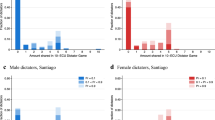Abstract
This study was designed as a test of two competing explanations of gender differences in distributive justice: (a) the equity-equality hypothesis, which states that males endorse equitable distributions more than females and females endorse equal distributions more than males; and (b) the exploitation-accommodation hypothesis, which states that the sexes vary their norm endorsement according to self-favoring (males) or other-favoring (females) distribution outcomes. Preadolescent and college-aged subjects rated the fairness of reward distributions of vignette characters who had contributed either more or less than a co-worker in a task, and had subsequently divided the rewards either equitably or equally. The data provided no support for the equity-equality hypothesis, but did support the exploitation-accommodation hypothesis. Specifically, females rated equitable distributions of inferior workers as more fair than males did. Thus, the popular conclusion that males have a stronger commitment to equity than females must be rejected.
Similar content being viewed by others
References
Austin, W., & McGinn, N. C. Sex differences in choice of distribution rules. Journal of Personality, 1977, 45, 379–394.
Barnett, M. A., & Andrews, J. Sex differences in children's reward allocation under competitive and cooperative instructional sets. Developmental Psychology, 1977, 13, 85–86.
Barnett, M. A., Andrews, J., & Howard, J. A. Children's reward allocations after competition: Sex differences and the effect of task structure. Journal of Genetic Psychology, 1978, 133, 149–150. (a)
Barnett, M. A., Howard, J. A., & Andrews, J. The role of imitation and sex differences in children's reward allocation behavior. Journal of Genetic Psychology, 1978, 133, 299–300. (b)
Benton, A. Productivity, distributive justice and bargaining among children. Journal of Personality and Social Psychology, 1971, 18, 68–78.
Berndt, T. J. Effects of friendship on prosocial intentions and behavior. Child Development, 1981, 52, 636–643.
Carles, E. M., & Carver, C. S. Effects of person salience versus role salience on reward allocations in a dyad. Journal of Personality and Social Psychology, 1979, 37, 2071–2080.
Crockenberg, S. B., Bryant, B. K., & Wilce, L. S. The effects of cooperatively and competitively structured learning environments on inter- and intrapersonal behavior. Child Development, 1976, 47, 386–396.
Deutsch, M. Equity, equality, and need: What determines which value will be used as the basis of distributive justice? Journal of Social Issues, 1975, 137–149.
Gilligan, C. In a different voice: Psychological theory and women's development. Cambridge, MA: Harvard University Press, 1982.
Hook, J., & Cook, T. Equity theory and the cognitive ability of children. Psychological Bulletin, 1979, 86, 429–445.
Kahn, A., Nelson, R. E., & Gaeddert, W. P. Sex of subject and sex composition of the group as determinants of reward allocations. Journal of Personality and Social Psychology, 1980, 38, 737–750.
Kahn, A., O'Learn, V., Krulewitz, J. E., & Lamm, H. Equity and equality: Male and female means to a just end. Basic and Applied Social Psychology, 1980, 1, 173–197.
Keil, L. J., & McClintock, C. G. A developmental perspective on distributive justice. In D. Messick & K. Cook (Eds.), Theories of equity: Psychological and sociological perspectives. New York: Praeger, 1983.
Leventhal, G. S. The distribution of rewards and resources in groups and organizations. In L. Berkowitz & E. Walster (Eds.), Advances in experimental social psychology, (Vol. 9). New York: Academic Press, 1976.
Leventhal, G., & Lane, D. Sex, age, and equity behavior. Journal of Personality and Social Psychology, 1970, 15, 312–316.
Leventhal, G., Popp, A., & Sawyer, L. Equity or equality in children's allocation of rewards to other persons? Child Development, 1973, 44, 753–763.
Major, B., & Adams, J. B. Role of gender, interpersonal orientation, and self-presentation in distributive justice behavior. Journal of Personality and Social Psychology, 1983, 45, 598–608.
Major, B., & Adams, J. B. Situational moderators of gender differences in reward allocations. Sex Roles, 1984, 11, 869–880.
Major, B., & Deaux, K. Individual differences in justice behavior. In J. Greenberg and R. L. Cohen (Eds.), Equity and justice in social behavior. New York: Academic Press, 1982.
Major, B., McFarlin, D. B., & Gagnon, D. Overworked and underpaid: On the nature of gender differences in personal entitlement. Journal of Personality and Social Psychology, 1984, 47, 1399–1412.
Mikula, G. Nationality, performance, and sex as determinants of reward allocation. Journal of Personality and Social Psychology, 1974, 29, 435–440.
Olejnik, A. B., Tompkins, B., & Heinbuck, C. Sex differences, sex-role orientation, and reward allocations. Sex Roles, 1982, 8, 711–719.
Reis, H. T., & Jackson, L. Sex differences in reward allocation: Subjects, partners, and tasks. Journal of Personality and Social Psychology, 1981, 40, 465–478.
Sampson, E. E. On justice as equality. Journal of Social Issues, 1975, 31, 45–64.
Stake, J. E. Exploring the basis of sex differences in third-party allocations. Journal of Personality and Social Psychology, 1985, 6, 1621–1629.
Vinacke, W. E. Sex roles in a three-person game. Sociometry, 1959, 22, 343–360.
Watts, B. L., Messe', L. A., & Vallacher, R. R. Toward understanding sex differences in pay allocation: Agency, communion, and reward distribution behavior. Sex Roles, 1982, 8, 1175–1187.
Author information
Authors and Affiliations
Additional information
This research was conducted with the support of the National Science Foundation under Grant No. BNS-8507000 to the second and third authors. We thank the principal and teachers of the A. D. Henderson University School for their generous cooperation in supplying a subject pool. We also thank Kenneth L. Wilson and an anonymous reviewer for their helpful comments on an earlier draft of this manuscript.
Rights and permissions
About this article
Cite this article
Boldizar, J.P., Perry, D.G. & Perry, L.C. Gender and reward distributions: A test of two hypotheses. Sex Roles 19, 569–579 (1988). https://doi.org/10.1007/BF00289736
Issue Date:
DOI: https://doi.org/10.1007/BF00289736




